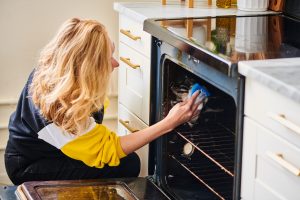The kitchen is the heart of every house. As we can’t live without a heart similarly house can’t live without a kitchen. We know that kitchen is used to cook food, so it gets dirty fast which is not good for us. So, it is our general responsibility to keep this place clean and hygienic. An unclean kitchen is a primary cause of the birth of dangerous bacteria. These bacteria are enough to make you ill for a long time. Hence, if you want to live healthy and happy, then you should have to keep your kitchen clean and fresh as well.
So, let’s discuss some of the basic cleaning tips to keep your kitchen clean and germ-free. Shall we go?
- The kitchen counter is the most used place in a kitchen. So, it is usual that your kitchen counter is always messy. So, always try to keep your counter clean. It is advisable to mop your kitchen table after using it. Keep your unnecessary kitchen element in its position which will allow your kitchen to look clean and clutter-free.
- You need to clean your gas and burner regularly after using them. Gas burners can remove easily so use soap and a moist sponge to wipe them.

- Clean your fridge at least once a week. Clean your fridge with soap or baking soda and Luke warm water. It can help you to prevent the spot from the refrigerator.
- After cleaning your fridge then it is time to clean out your kitchen cabinet. To clean your cabinet, remove all the containers or kitchen supplies and then wipe the cabinet with a wiping cloth and then place all the containers or supplies in their place. Also, clean your food containers with a wet cloth. Some more cleaning tips suit every kitchen just given at Cleaning Heights that help you to clean your cabinet and food containers.
- Clean you’re all your kitchen appliances at least two or three times a week. It has two advantages one is that it will look clean and look like a new appliance, and another is your machine will work for a long time.
- Clean the facets of your kitchen regularly. Use a toothbrush with soapy water to reach those areas where we can’t reach such as the crannies of a sink. You can also use white vinegar to clean your kitchen faucets.
- The next step is to clean your kitchen sink on a routine basis. You can use a detergent or baking soda to clean it. You can also use lemon juice to de-stain the surface.
- It is a good idea to dump your entire kitchen’s trash into the bin instead of the cooking surface. Moreover, dust your kitchen regularly to avoid dust from your kitchen.
- Sweep the floor of your kitchen and collect all the garbage, and crumbs that might be on your kitchen’s floor. If you find any stains on your floor, then mop the floor with soapy water.
- Hire a rubbish removal company to remove all the waste from your kitchen or house.
As we know that health is wealth. So keep your kitchen or house clean so that you can live a healthy life.

